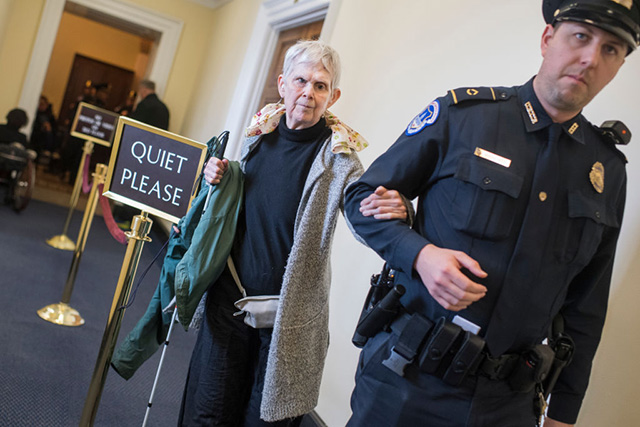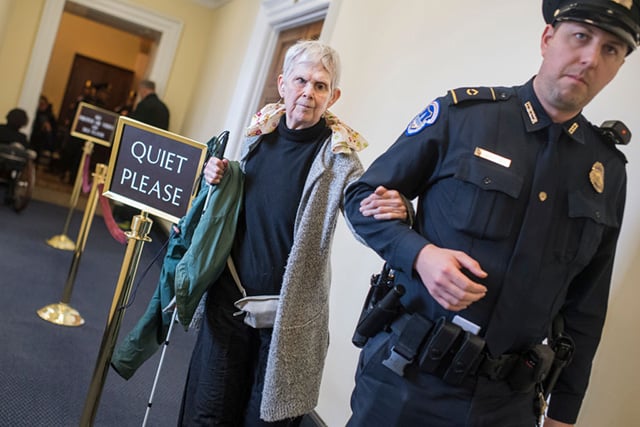
 Harriotte Ranvig, 71, is escorted out of the House chamber on February 15, 2018, after she and a group of protesters disrupted the vote on the ADA Education and Reform Act, which makes it harder for disabled people to sue for discrimination. (Photo: Tom Williams / CQ Roll Call)
Harriotte Ranvig, 71, is escorted out of the House chamber on February 15, 2018, after she and a group of protesters disrupted the vote on the ADA Education and Reform Act, which makes it harder for disabled people to sue for discrimination. (Photo: Tom Williams / CQ Roll Call)
Anita Cameron remembers the Capitol Crawl like it was yesterday. It was the spring of 1990, and Congress was dragging its feet toward a vote on the Americans with Disabilities Act (ADA), a landmark piece of legislation protecting the civil rights of people with disabilities. To call attention to the bill and the accessibility challenges that people with disabilities face on a daily basis, Cameron and dozens of other activists left their wheelchairs and walkers at the steps of the Capitol building and crawled their way to the top before filling the rotunda with their chanting voices.
Cameron and more than 100 others were arrested that day. The protest had an impact: President George H. W. Bush signed the ADA into law a few months later.
However, the ADA has not been a magic bullet and is now under threat. Cameron, a Black feminist and LGBTQ activist, was back on Capitol Hill this week protesting a bill in the House that advocates say would gut the ADA in favor of businesses that have failed to accommodate people with disabilities.
As the House members voted 225-192 to pass the bill on Thursday, dozens of activists made their way into the chambers and could be heard chanting as surprised lawmakers turned to look over their shoulders. Cameron was arrested again along with 16 other people, marking her 134th arrest as a disability activist, according to organizers on the ground. The bill, known as HR 620, would make it more difficult to file lawsuits under the ADA against public accommodations like restaurants and stores that are not accessible to people with disabilities.
“You’re not going to get your rights because some politicians thought it would be a good thing, and you’ve got to fight to keep them,” Cameron told Truthout in an interview. “So, here it is, almost 28 years later and the ADA is in danger of being gutted … once again the onus falls on us.”
Earlier this week, Cameron was arrested with nine other activists from the direct-action wing of the disability movement as HR 620 moved out of committee. Videos posted on social media show police dragging activists across the floor and carrying one away in a wheelchair.
House Republicans generally supported the bill, and votes from a handful of Democrats secured its passage, to the dismay of progressive activists. Proponents backed by retail lobbyists argue the legislation is needed to stop frivolous lawsuits against businesses such as hotels, stores and restaurants with architectural barriers that make their facilities difficult for people with disabilities to access. The bill would require people with disabilities to give advance notice before filing a lawsuit under the ADA, and give businesses up to six months to outline a plan for removing the barrier and make “substantial progress” toward doing so, although what exactly constitutes “substantial progress” is unclear.
“So, this is basically saying to disabled people, ‘You can wait indefinitely for your rights to be honored,'” said Gregg Beratan, an activist with the grassroots disability rights group ADAPT and manager of government affairs at the Center for Disability Rights, in an interview with Truthout. “We are approaching the 28th anniversary of the ADA and they still want us to beg for our rights. It’s appalling.”
The legislation would saddle people with disabilities with “additional time-consuming and exhausting” red tape when asserting their rights and deal a “devastating blow” to the ADA, according to ADAPT. The ADA allows people with disabilities to sue public businesses if they fail to make their facilities accessible to people in wheelchairs, for example. Such lawsuits are permitted to force compliance with the ADA and pay for legal fees, but not to demand monetary damages.
These types of lawsuits — along with plenty of voluntary efforts made by forward-thinking institutions and business — have been instrumental in expanding equal access to public life for people with disabilities since 1990. HR 620 would make it more difficult to file lawsuits and remove incentives for voluntary compliance, according to the Disability Rights Education and Defense Fund.
Cameron said she uses wheelchairs, walkers and other mobility devices to get around, and today, she can go to nearly any city in the country and use public transportation similarly to people without disabilities, thanks to the ADA. She argues that businesses have had almost 28 years to come into compliance with the law, and there is no reason to give those that haven’t extra time to do so now.
“I can get on a lift, and people generally don’t stare anymore…. I can get on a bus and go wherever I want to go,” Cameron said. “I can go to the movies, I can go to restaurants, I can go into banks, I can go places that everyone else can go…. This is why it is really distressing and disturbing that you have some of these places that are not accessible, and if [HR 620] passes, then they will have that much longer to remain inaccessible.”
Beratan, who was arrested along with Cameron at the initial protest in Congress this week, said there has been a problem with frivolous lawsuits filed under the ADA, but only by a small number of lawyers operating in just a few states. He said that if lawmakers really wanted to fix the problem, they would write legislation that targets those attorneys, not the ADA and people with disabilities.
The House rejected an amendment offered by Rep. Jim Langevin (D-Rhode Island) that would have removed the most controversial elements of the bill. Langevin, who was paralyzed by a gunshot while helping police teach gun safety to Boy Scouts, is the first quadriplegic to serve in Congress. Now that the bill has passed the House, disability rights activists will turn their attention to the Senate, where Sen. Tammy Duckworth (D-Illinois), who lost her legs to a rocket-propelled grenade attack while flying an Army National Guard helicopter in Iraq, is rallying lawmakers against the bill.
Cameron said the legislation fits into a larger pattern that the disability movement is all too familiar with. When people with disabilities are unable to access public spaces and resources like everyone else, the onus falls back on them to challenge whatever business or institution is responsible for making a change. When politicians attack and undermine hard-fought civil rights, it’s up to the disability movement to raise public awareness and organize in protest.
“To me, if [HR 620] passes and they get away with that, then what other parts of the ADA are they going to come for?” Cameron said. “They are not going to stop. It seems that this administration is taking away the hard-earned rights for people with disabilities that we fought for.”
Cameron said it’s important to remember that disability rights are civil rights, and activists are demanding equal rights, not “special” rights for certain people.
Businesses should make their facilities accessible because it’s the right thing to do, but that’s not the only incentive. One in three households in the United States has a member with a disability, and together they represent $1 billion in spending power, according to the commercial analytics firm Neilson. Every shopper has their own needs that drive spending habits, and people with disabilities tend to spend more on common retail items than non-disabled consumers.
“You really don’t want our money?” Cameron asked.
Speaking against the authoritarian crackdown
In the midst of a nationwide attack on civil liberties, Truthout urgently needs your help.
Journalism is a critical tool in the fight against Trump and his extremist agenda. The right wing knows this — that’s why they’ve taken over many legacy media publications.
But we won’t let truth be replaced by propaganda. As the Trump administration works to silence dissent, please support nonprofit independent journalism. Truthout is almost entirely funded by individual giving, so a one-time or monthly donation goes a long way. Click below to sustain our work.